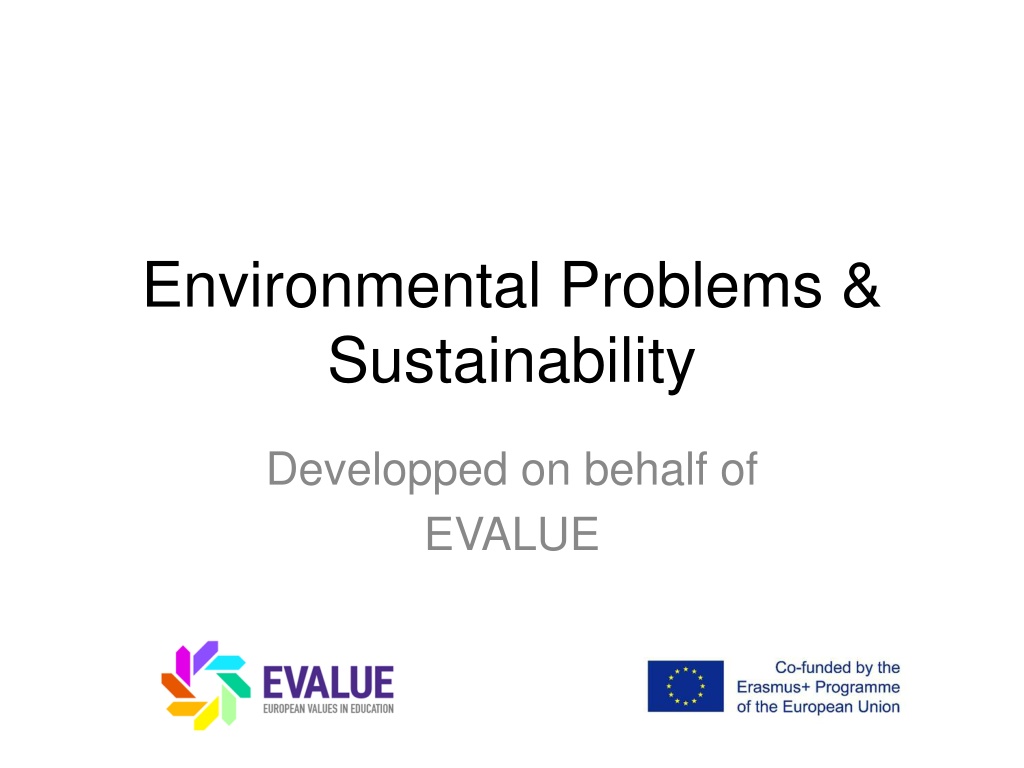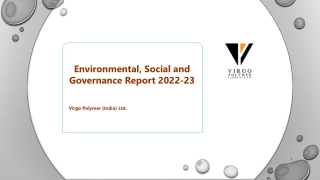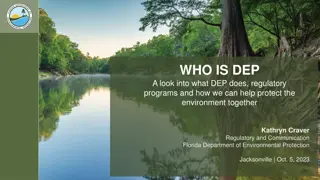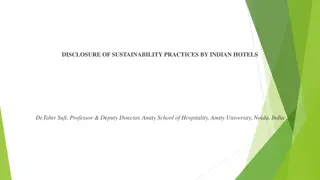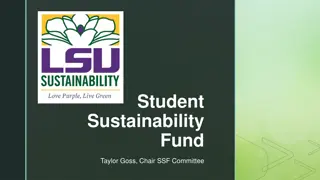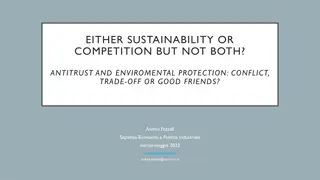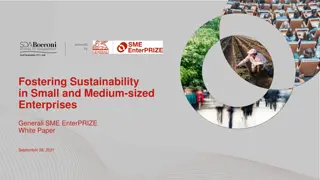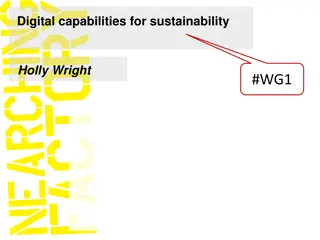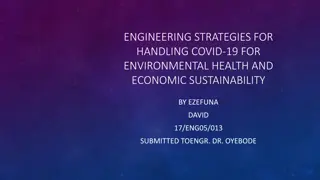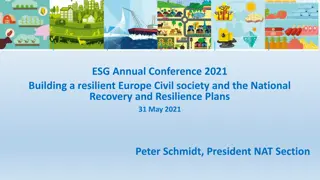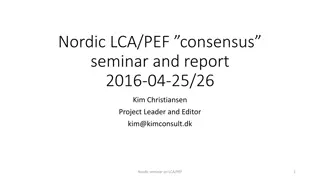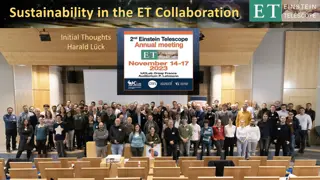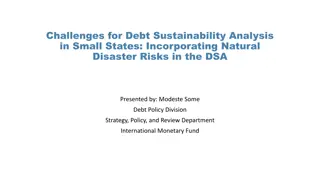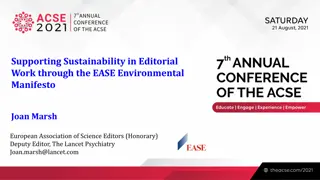Environmental Problems and Sustainability Challenges Explored through EVALUE
Explore statements related to environmental problems and sustainability in the context of EVALUE, where participants must choose red (against), yellow (doubt), or green (for) cards to express their views. The statements cover topics such as energy conservation, toxic substance discharge, animal feed sourcing, and responsible clothing production. Engage in discussions, provide arguments for and against each statement, and delve into assignments focusing on environmental issues and entitlement.
Download Presentation

Please find below an Image/Link to download the presentation.
The content on the website is provided AS IS for your information and personal use only. It may not be sold, licensed, or shared on other websites without obtaining consent from the author. Download presentation by click this link. If you encounter any issues during the download, it is possible that the publisher has removed the file from their server.
E N D
Presentation Transcript
Environmental Problems & Sustainability Developped on behalf of EVALUE
Statements You will see a number of statements. You have 15 seconds to think. Then you choose a red (against), yellow (doubt) or green (for) card and hold it up. Then the statements are discussed. Write down the arguments for and against each statement in your notebook.
Statements We must save energy in the Netherlands so that islands in the Pacific Ocean are not flooded. https://pixabay.com/de/illustrations/ampel-verkehr-beleuchtung-stra%C3%9Fe-4631333/
Statements Germany may discharge toxic substances into the Rhine even if they end up in Dutch drinking water. https://pixabay.com/de/illustrations/ampel-verkehr-beleuchtung-stra%C3%9Fe-4631333/
Statements Feeding animals with soya from other countries in order to sell kilo-crunchers must be banned. https://pixabay.com/de/illustrations/ampel-verkehr-beleuchtung-stra%C3%9Fe-4631333/
Statements The clothes we wear must be produced under responsible working conditions, even if they come from Asia or Africa. https://pixabay.com/de/illustrations/ampel-verkehr-beleuchtung-stra%C3%9Fe-4631333/
Assignment Now read the text "Environmental Problems, Sustainability & Entitlement". Then do the assignments.
What is most important when dealing with environmental problems? Step 0: Read the aspects carefully. Are there any ambiguities? Step 1: Choose only the 9 most important aspects. Step 2: ......... Step 3: .........
What is most important when dealing with environmental problems? Debriefing: Which aspects did you choose as most important?
IN WHICH COUNTRIES DO YOU THINK PEOPLE ARE MORE CONCERNED ABOUT THE ENVIRONMENT? NETHERLANDS - ALBANIA - BOSNIA - H. - GERMANY - SWEDEN I THINK PEOPLE IN .... ARE MORE/LESS CONCERNED ABOUT THE ENVIRONMENT BECAUSE ..... SWEDEN NETHERLANDS GERMANY BOSNIA HERCEGOVINA ALBANIA Source: https://mapswire.com/europe/political-maps/
WHAT DO YOU THINK, WHICH PEOPLE ARE MORE CONCERNED ABOUT THE ENVIRONMENT C.Q. IS THERE ANY MORE MONEY TO BE MADE FOR THE ENVIRONMENT? Think about: EDUCATION (Low/high) INCOME (low/high) GENDER (men/women) AGE (young/old) RELIGIOSITY (yes/no) I THINK .......... ARE MORE/LESS CONCERNED ABOUT THE ENVIRONMENT BECAUSE .......
HOW DO WE KNOW THIS? As you have just done, social scientists formulate hypotheses, which they support with arguments. If possible, they then try to prove their ideas with data. You are now going to answer questions that social scientists use to measure dimensions. You should imagine a dimension as a line with opposing views at the ends. dimension ++ - - Only coffee Only Tea Mostly coffee Mostly Tea Coffe and Tea - One dimension is about the environment, the other is about priorities for your country at the moment. Sources: https://commons.wikimedia.org/wiki/File:A_small_cup_of_coffee.JPG https://tr.m.wikipedia.org/wiki/Dosya:Lipton-mug-tea.jpg
DO YOU UNDERSTAND THE QUESTIONS AND DO YOU KNOW WHAT TO DO? To what extent do you agree or disagree with the following statements? It's just too hard for someone like me to do much for the environment There are more important things in life than protecting the environment There is no point in making an effort for the environment if others do not do the same Many claims about the endangered environment are exaggerated Fully agree - agree - neither agree nor disagree - disagree - strongly disagree You have to indicate the first and second priority, what you think should be objectives for your country for the next 10 years. A Maintaining order B Giving more people more influence on important government decisions C Preventing that prices increase D Protecting freedom of speech
1. GO TO: www.atlasofeuropeanvalues.eu 2. CHOOSE LANGUAGE 3. Go to CLASSROOM: 4. Fill in .. at STUDENT CODE and enter. 5. Answer the questions, close and leave the classroom. READ THE TEXT IN GENERAL FILES "SHORT EXPLANATION OF ENVIRONMENTAL AWARENESS".
PLEASE READ THE TEXT CAREFULLY. DO YOU HAVE QUESTIONS ABOUT THE TEXT? Source: https://pixabay.com/illustrations/question-mark-note-duplicate-2405202/
Do you recognise the three levels of concern about the environment? What belongs to: Environmental awareness Support for the environment Environmental behaviour ?
Working with the classroom-tool of EVALUE Discuss the results in the classroom-tool. Look to the results of the countries indicated here before and to different respondent groups.
SUMMARISING THE RESULTS "We see that both/only economic wealth and exposure to environmental problems explain environmental awareness: People with high/low income, high/low education level, young/old people, men/women, who are not/religious, have lower/higher environmental awareness. This can be explained, because people with high/low income ..., high/low ... education level, who are not/religious....., young people/elderly ......, men/women .......... The following aspects seem to provide the best explanation: ...................."
Traffic Light You may now only use the red (no) or green (yes) card for the next statement. https://tr.wikipedia.org/wiki/Ampelm%C3%A4nnchen#/media/Dosya:Ampelmann.svg 19
Traffic Light I am willing to donate 15% of my income (pocket money) for the environment, if I can be sure that the money will be used for that purpose. https://tr.wikipedia.org/wiki/Ampelm%C3%A4nnchen#/media/Dosya:Ampelmann.svg 20
Intelligent guesswork In which European countries do you think people are more/less willing to give money for the environment? 21
- Do the explanations dealt with help you to better understand your own views? To what extent? Do the teaching strategies used (Snowball, Intelligent guesswork, Stoplight) help you to understand different points of view? How? - Source: https://www.picpedia.org/highway-signs/u/understanding.html
Climate change - Assignment 1. Read B 141 on the carbon cycle and B 142 on the enhanced greenhouse effect. 2. Then write the words in bold below each other in your notebook. 3. Then watch the clip from Deutsche Welle TV "What is the greenhouse effect?" Write down, which concepts from B141 and B142 are explained in the video. Also write down, which additional information is given in the video. You will have to watch the video twice to be able to write everything down properly. 4. Review your notes again. Is there anything you don't understand? Ask your teacher. https://https://www.youtube.com/watch?v=BPJJM_hCFj0/
Diamond Ranking What is the best solution? 1. saving energy by yourself 4. nuclear energy 2. wind power 3. bio-mass 5. coal and lignite 6. laws on power- hungry machines 9. hydropower 7. solar power 8. natural gas
Class-Diamond What is the best solution? 1. saving energy by yourself 4. nuclear energy 2. wind power 3. bio-mass 5. coal and lignite 6. laws on power- hungry machines 9. hydropower 7. solar power 8. natural gas
Class-Diamond What is the best solution? 1. Read in your textbook in Section 1 and in B 130 and 131 what it says about your topic. Write down all the positive and negative aspects. 2. Visit the advised website. Complete your list of positive and negative aspects. 3. Find a third source on the Internet for additional information on your topic. State why your source is a good one. Complete your list. 4. Go to www.atlasofeuropeanvalues.eu. Choose Maps. Enter climate in the search box. Then choose the map that fits your theme. What conclusion can you come to when looking at the results for the Netherlands? Are there any differences between the age groups? Which countries stand out to you? Can you explain this? Write down your findings in your list of positive aspects (supporters) and negative aspects (opponents).
Class-Diamond What is the best solution? To what extent does your aspect rank correctly in the ranking? Explain your finding and substantiate your opinion with your research results.
Class-Diamond What is the best solution? Source: https://pmo.partners/avrupa-yesil-mutabakat-cagrisi/ EU must be climate neutral and climate proof by 2050. In which countries and in which population groups (young/old) could the class-diamond be supported, and in which countries/which groups could not? What are the possible reasons for this?
Case Study You are now going to carry out a larger enquiry. You will investigate a topic that has to do with fashion or food. Your research comprises two parts: A) you describe, what the problem is and B) you describe a concrete solution to that problem, discussing the advantages and disadvantages of this solution. You may choose from the following themes: Food Unhealthy Food Fertiliser Surplus Mass Livestock Posture Soil Fertility Food Waste Crop Protection Water Quality For a start look here for information: Fashion Ethical Fashion Sustainable Fashion https://www.sustainweb.org/sustainablefood/what_is_sustainable_food/ http://www.fao.org/sustainability/en/ https://www.sustainablejungle.com/sustainable-living/ethical-sustainable-fashion/
Gallery Walk View all posters: Which information on the problems studied was new? Which of the investigated solutions is interesting and would you possibly support/apply yourself?
Gallery Walk View all posters: Which information on the problems studied was new? Which of the investigated solutions is interesting and would you possibly support/apply yourself? DEBRIEFING
Reflection Please answer the following questions in detail: What did you learn in terms of content? Think about environmental problems, sustainability, entitlement, people's views on environmental problems)? What would you like to learn more about? What exactly did you learn from the research you carried out? What have you learnt from the Atlas of European Values? The maps, the class tool, the teaching strategies? What does what you have learned mean for you personally?
